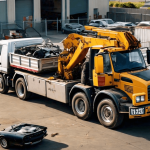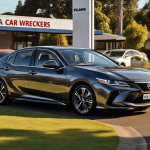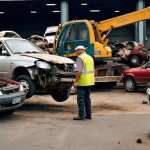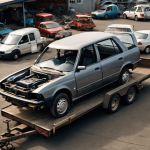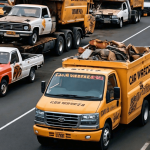

Where Can I Sell My Non-Running Car in Auckland?
Sell my non-running car in Auckland may seem daunting, but it can be a smooth process with the right approach. This guide will walk you through every stage of the process, from determining the vehicle’s condition to locating the right buyer to ensure a successful sale.
Understanding the Challenge: Selling a Non-Running Car in Auckland
Selling a non-running car presents unique challenges, especially in a bustling city like Auckland. The first hurdle is to acknowledge the reasons behind your car’s non-operational state. Whether it’s due to mechanical issues or age-related wear and tear, understanding the root cause is crucial.
Importance of Finding the Right Platform
Choosing the right platform to sell your non-running car is pivotal. Auckland offers various avenues, including online marketplaces, scrap yards, and private buyers. Finding the most suitable platform ensures a faster sale and the best value for your vehicle.
Assessing the Condition of Your Non-Running Car
Identifying Mechanical Issues
Before listing your car for sale, it’s essential to identify and disclose any mechanical issues. This openness establishes reasonable expectations and fosters confidence among prospective customers.
Evaluating the Overall Condition
Beyond mechanical problems, assessing the overall condition of your non-running car includes factors like body damage, interior wear, and the state of essential components. A comprehensive evaluation helps determine the fair market value.
Preparing Your Non-Running Car for Sale
Cleaning and Detailing
Even though your car may not be operational, presenting it in the best possible condition enhances its appeal. Getting a thorough cleaning and detailing done can significantly impact drawing in potential purchasers.
Gathering Relevant Documents
Gather all necessary documentation, including the title, maintenance records, and other relevant paperwork. Having a complete set of documents streamlines the selling process.
Researching Potential Buyers and Platforms
Online Marketplaces
Online platforms like Craigslist, Facebook Marketplace, and Trade Me are famous for selling non-running cars. Explore these options and assess their reach and user base.
Scrap Yards and Salvage Yards
Scrap yards and salvage yards may offer a solution for vehicles beyond repair. Research local businesses that specialize in recycling and salvaging cars.
Private Buyers
Some individuals or mechanics may be interested in purchasing non-running cars for parts or restoration projects. Contact local communities or post on relevant forums to connect with potential private buyers.
Setting a Realistic Price
Factors Influencing the Value
Consider your non-running car’s make, model, year, and overall condition when determining its value—research similar listings to gauge the market and set a competitive yet realistic price.
Price Negotiation Strategies
Be prepared for negotiations. Having a bottom-line price in mind and being flexible during discussions can facilitate a mutually beneficial agreement.
Creating an Attractive Listing
Crafting a Compelling Title
The first thing potential buyers see is the title of your listing. Craft a compelling and accurate title highlighting crucial features or issues, attracting the right audience.
Detailed and Honest Description
Give a thorough and truthful explanation of your non-running vehicle. Highlight any unique features, be transparent about its condition, and mention recent maintenance or repairs.
High-Quality Images
Accompany your listing with high-quality images from various angles. Clear visuals give potential buyers a better understanding of the vehicle’s condition.
Utilizing Social Media and Local Networks
Tapping into Community Groups
Through local community forums and organizations, social media platforms like Facebook may help businesses and potential customers communicate.
Post your listing and engage with inquiries promptly.
Leveraging Social Media Platforms
Share your listing on personal and professional social media accounts to broaden its reach. Friends, family, or acquaintances might know someone looking for a non-running car.
Dealing with Inquiries and Offers
Effective Communication
Respond to inquiries promptly and professionally. Provide additional information as needed and be open to negotiating terms.
Handling Negotiations Professionally
Negotiations are typical in the selling process. Approach them professionally, and be willing to compromise to reach a fair deal.
Finalizing the Sale
Completing Necessary Paperwork
Once an agreement is reached, ensure all paperwork is completed accurately. Transfer the title and provide any additional documents required by the buyer.
Ensuring a Smooth Handover Process
Coordinate the handover of the vehicle smoothly. Discuss towing or transportation options with the buyer if the car is not drivable.
Alternatives to Selling
Donating the Non-Running Car
Consider donating your non-running car to charitable organizations. Some charities accept non-operational vehicles and use the proceeds for their causes.
Recycling Options
Explore environmentally friendly options for recycling your non-running car. Some facilities specialize in dismantling and recycling vehicles, minimizing environmental impact.
Common Pitfalls to Avoid
Scams and Fraudulent Activities
Be vigilant against scams. To protect yourself from fraud, ensure prospective customers are genuine and use safe payment options.
Unrealistic Expectations
Set realistic expectations regarding the value and selling process. Frustration and disappointment can result from having unrealistic expectations.
Testimonials and Success Stories
Real-Life Experiences of Selling Non-Running ars
View the endorsements and achievements of people who have sold their non-running cars successfully.
They sold their non-running cars. Learn from their experiences and apply valuable insights to your sales.
Learning from Others’ Mistakes and Successes
Understanding common pitfalls and success factors through real-life stories can guide you in making informed decisions throughout the selling process.
The Environmental Impact
Proper Disposal Methods
Examine the effects of disposing of an idle car on the environment.
Choose disposal methods that prioritize recycling and minimize harm to the environment.
Choosing Eco-Friendly Options
Investigate environmentally efficient ways to eliminate non-running cars to support the automotive industry’s sustainability initiatives.
Frequently Asked Questions (FAQs)
How do I determine the value of my non-running car?
Determining the value involves assessing factors like the make, model, year, and overall condition—research similar listings to gauge market prices.
Are there specific regulations for selling non-running cars in Auckland?
Check local regulations regarding the sale of non-running cars. Ensure compliance with any documentation or reporting requirements.
What documentation do I need to sell my car?
You’ll typically need the title, maintenance records, and other relevant paperwork. Verify specific requirements in your region.
How long does the selling process usually take?
The length varies and can be anywhere from a few days to several weeks, depending on the market demand and the discussion speed.
Can I sell a non-running car without a title?
Selling a car without a title can be challenging. Explore options with local authorities or seek legal advice to address this issue.
Conclusion
Recap of Key Points
Selling a non-running car in Auckland requires careful planning and execution. Each step contributes to a successful transaction, from assessing the condition to finalizing the sale.
Encouraging Readers to Take the Next Steps
With knowledge and a comprehensive guide, readers are encouraged to take the following steps to sell their non-running cars. Whether opting for online platforms, private buyers, or alternative methods, success is within reach.
Even if your car is a total wreck, it is still valuable to someone. Here’s how to obtain the most money for your trash automobile and get the best bargain with Cash For Scrap Cars– Cash For Cars Auckland. Is it the period to dump your ride? Don’t just throw it out with Car Removals West Auckland; even though it’s damaged and broken, your car can be worth something.
Getting cash for junk cars is simple if you know what you’re doing. We have car removals West Auckland put together a list of four suggestions to help you obtain the most money for your trash automobile.
1. Get a quote by calling around with Cash for Cars Auckland.
When trying to Junk a Car for Cash with Car Removals South Auckland, the first thing you should do is call around to find the greatest price. There are probably a few places in your neighborhood that will pay you cash for your junk car. Consider your options with Car Removals West Auckland with CashForScrapCars after getting a few bids. The greatest advice is to go with the firm that offered you the most money for your vehicle. This is usually a junk auto manufacturer that Cash For Cars Auckland undercuts all of its competitors.
2. Double-check for “Additional Costs” with Car Removals West Auckland!
While you’re on the phone getting quotes for your car, you might want to ask a few more questions. One thing to think about as per Cash For Cars West Auckland is whether or not the company will come to acquire your car for you and provide a free tow. If you have to pay to have it towed to them, the amount of money you make as part of this agreement will be significantly reduced. Look for a junk car firm-Cash For Cars Auckland Crash Cars that will tow your vehicle to them for free as part of the purchase procedure.
3. Confirm that they are buying the car “as is” from you with Cash For Cars Auckland.
Before you sell your car, keep in mind that trash car firms will buy it in any condition. There is someone out there prepared to take your junk automobile off your hands, whether it has a lot of miles on it, minor dings, or serious damage. Even if your trash automobile isn’t running as per Car Removals West Auckland, you can still sell it. However, ensure that they are truthful and do not deduct money from the price for anything you neglected to inform them. For example, if you claim the automobile starts but it does not when they arrive, you must ensure that they will pay you a specific sum with Car Removals West Auckland
4. Select a Reliable Business-like Cash For Scrap Cars-Car Removals West Auckland
This is a crucial stage as per the Cash for Cars Auckland. You want to work with a company that values dependability, responsibility, and a positive reputation in the community. It doesn’t matter if you get a very high quote from a company that won’t deliver on its promises. You want to work with a company that pays cash for trash automobiles and values honesty above all else.
Benefits of Choosing Used Toyota Wreckers
Cost Savings
One of the primary advantages of buying from used Toyota wreckers is the significant cost savings. The fact that the Wrecker comes from salvaged cars means they are usually far less expensive than new ones, making them an affordable choice for auto maintenance and repairs.
Environmentally Friendly Option
Support environmental conservation efforts and save money by buying old components from Toyota wreckers. Recycling cars reduce the demand for new manufacturing, which in turn helps conserve natural resources and reduce greenhouse gas emissions.
Supporting Local Businesses
Choosing to buy from local Toyota wreckers supports small businesses within your community. This helps stimulate the local economy and sustain the automotive industry at a grassroots level.
How to Find Reliable Used Toyota Wreckers in Auckland
Finding reputable Toyota wreckers in Auckland requires some research and due diligence. Here are a few steps to help you find reliable suppliers:
Research Online
Start by searching online for Toyota wreckers in Auckland. Look for websites or directories that list reputable wreckers in your area and browse their inventory and services.
Check Reviews and Testimonials
Before making a purchase, read reviews and testimonials from previous customers. This will give you insight into the reputation and reliability of the wreckers, helping you make an informed decision.
Visit Local Yards
Visit the yards of Toyota wreckers in person. This will allow you to personally inspect the items and ensure their quality and condition satisfy your needs.
Things to Consider When Buying from Used Toyota Wreckers
When purchasing from Toyota Wreckers, it's essential to consider the following factors:
Compatibility
Verify that what you're purchasing is compatible with your specific Toyota model and year. Different models may have variations in parts, so it's crucial to double-check compatibility to avoid buying the wrong components.
Price Comparison
Compare prices among different Toyota wreckers to ensure you're getting a competitive deal. While cost savings are a significant advantage of buying from wreckers, it's still wise to shop around and find the best value for your money.
Reputation
Research the reputation of the Toyota wreckers before making a purchase. Look for reviews and testimonials from other customers to gauge their satisfaction with the products and services offered by the wreckers.
Tips for Selling Your Toyota to Wreckers
If you're looking to sell your old or damaged Toyota vehicle to wreckers, consider the following tips:
Clean and Prepare Your Vehicle
Before selling your Toyota to wreckers, clean it thoroughly and remove any personal belongings or valuables. This will make the process smoother and more efficient for both parties involved.
Gather Necessary Documents
Ensure you have the car's title, registration, and service records, among other necessary paperwork. This will streamline the selling process and help ensure a seamless transaction.
Negotiate Fairly
When negotiating with Toyota wreckers, be fair and reasonable in your expectations. Consider factors such as the condition of your vehicle and its mileage.
FAQs
Q1. Can I sell my damaged Toyota to a wrecker?
A1. Yes, you can sell your damaged Toyota to a wrecker. Wreckers specialize in buying vehicles, including damaged ones, for salvage purposes.
Q2. What types of Toyotas do wreckers typically accept?
A2. Wreckers typically accept all types of Toyotas, including cars, trucks, SUVs, and vans, regardless of their condition or model year.
Q3.What documents do I need to sell my Toyota to a wrecker?
A3. Typically, you'll need to provide the wrecker with the vehicle's title or proof of ownership, as well as any other relevant documents, such as identification and registration. The specific requirements may vary depending on local regulations and the wrecker's policies.
Can I negotiate prices with Toyota Wreckers?
Many Toyota wreckers are open to negotiation, especially for bulk purchases or repeat customers.
Conclusion
Used Toyota wreckers in Auckland offer a cost-effective and environmentally friendly solution for car owners. By selecting trustworthy wreckers and heeding the advice in this book, you may reduce the cost of auto repairs and support environmentally friendly initiatives in the automotive sector.
CASH FOR CARS WEST AUCKLAND
Why not Get Top Cash For Cars Auckland Services


